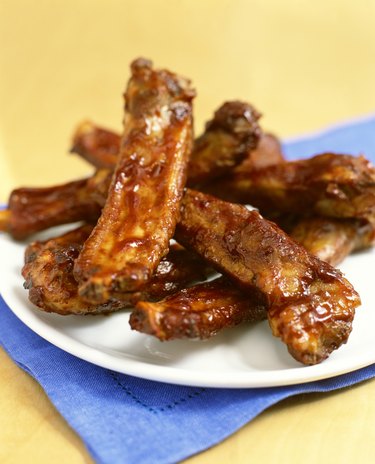
The nutritional values of pork and beef are very similar, so the choice between them for most people is based on flavor. Both pork and beef ribs can come from several different cuts of meat, and ribs can be prepared in numerous ways. Barbecue sauce and spice rubs are the traditional means of seasoning when cooking ribs, and these will add to the calories and nutrients of the meat.
Pork Baby Back Ribs
Video of the Day
Pork baby back ribs come from the back of the pig and usually contain loin meat. A 3 ounce, or 85 gram, serving of baby back ribs contains 243 calories, 19.56 grams of protein, 18.28 grams of fat and 71 milligrams of cholesterol. Mineral content includes 39 milligrams of calcium, 14 milligrams magnesium, 140 milligrams phosphorus, 204 milligrams potassium, 80 milligrams sodium, 2.61 milligrams zinc, 27.4 micrograms selenium, and trace amounts of iron, copper and manganese. Vitamins include 6.5 milligrams of niacin, 1.07 milligrams pantothenic acid, 66.8 milligrams choline, 17 IU of vitamin A, 41 IU of vitamin D and trace amounts of thiamine, riboflavin, vitamin B-6, vitamin B-12 and vitamin E.
Video of the Day
Beef Country-Style Ribs
Country-style ribs are not really ribs but meat cuts from various areas of the cow. According to the butcher website All About Meat, country-style ribs come from the chuck, cross rib, bottom round and flatiron sections of the cow. They are usually boneless and very meaty. A 3 ounce, or 85 gram, serving of country-style ribs contains 252 calories, 23.5 grams of protein, 17.5 grams of fat and 82 milligrams of cholesterol. Mineral content includes 14 milligrams calcium, 2.1 milligrams iron, 14 milligrams magnesium, 146 milligrams phosphorus, 210 milligrams potassium, 55 milligrams sodium, 7.57 milligrams zinc, 26.1 micrograms selenium, and trace amounts of copper and manganese. Vitamins include 3.2 milligrams niacin, 6 micrograms folate, 75.5 milligrams choline, 2.63 micrograms vitamin B-12, 23 IU of vitamin A, 5 IU of vitamin D, 1.4 micrograms vitamin K and trace amounts of vitamins E, B-6, pantothenic acid, riboflavin and thiamine.
Beef Short Ribs
Beef short ribs come from what is called the short plate of the cow, between the sixth and 10th ribs. A 3 ounce serving of beef short ribs contains 302 calories, 19.6 grams of protein, 24.2 grams of fat and 72 milligrams of cholesterol. Mineral content includes 8.0 milligrams of calcium, 2.00 milligrams of iron, 17 milligrams of magnesium, 147 milligrams phosphorus, 249 milligrams potassium, 54 milligrams sodium, 4.96 milligrams zinc, 19.0 micrograms fluoride, 18.4 micrograms selenium and trace amounts of copper and manganese. Vitamins include 3.12 milligrams niacin, 6.0 micrograms folate, 74.5 milligrams choline, 1.99 micrograms vitamin B-12, 16 IU of vitamin D, 1.7 micrograms vitamin K, and trace amounts of vitamin E, thiamine, riboflavin, pantothenic acid and vitamin B-6.
Seasonings
The use of barbecue sauce greatly changes the nutrition value of your ribs. There are a variety of barbecue sauces on the market, and you can also make your own, so nutritional values will vary. Check the nutrition label on any store-bought barbecue sauce. As an example, a 2 tablespoon serving of Sweet Baby Ray's barbecue sauce contains 70 calories, 17 grams of carbohydrates, 290 milligrams of sodium and 3.6 milligrams of vitamin C. If you use a rub, the spices will adjust your nutritional value. For example, using one teaspoon of garlic powder adds 10 calories, 0.51 grams of protein, 2.25 grams of carbohydrates and additional vitamins and minerals.